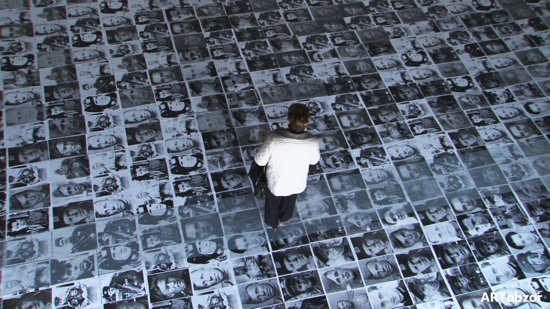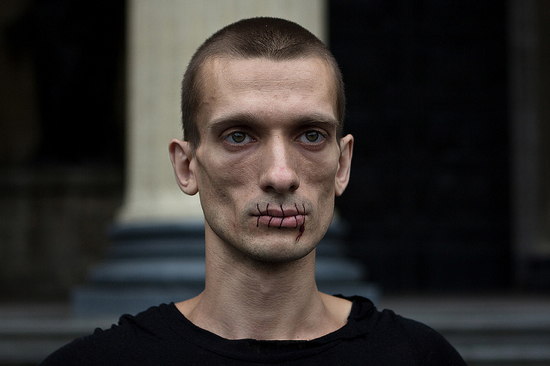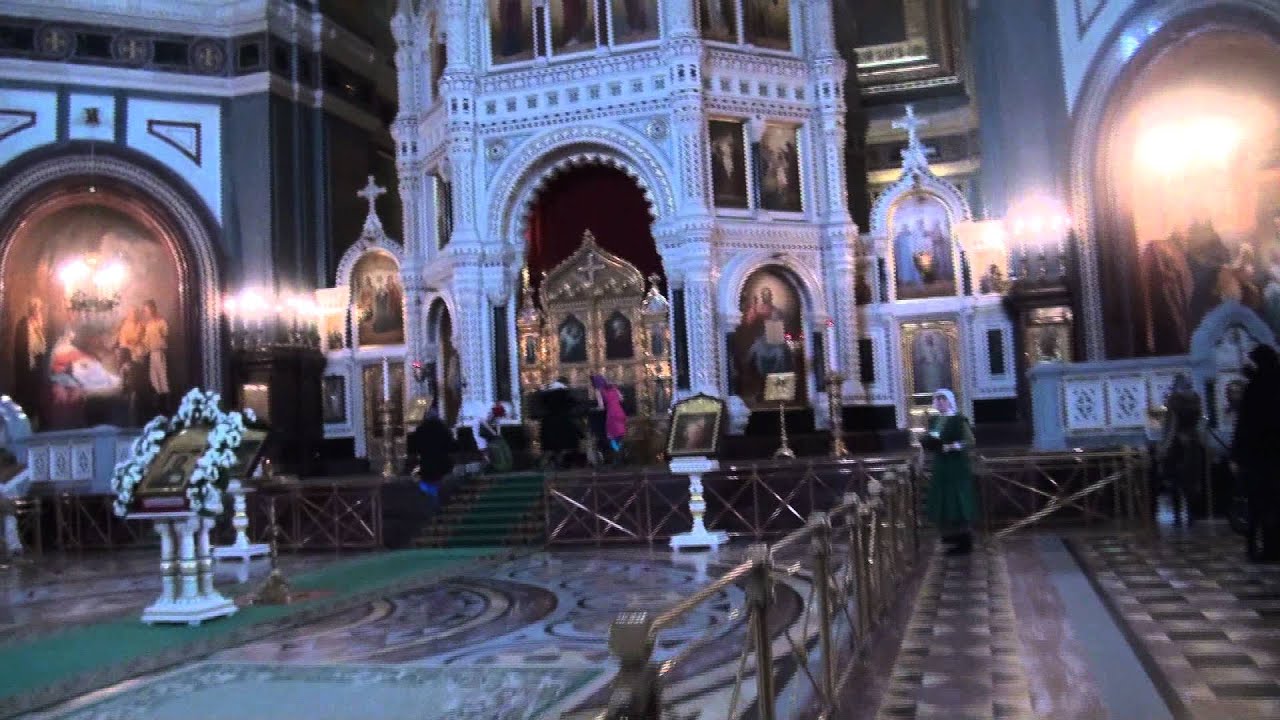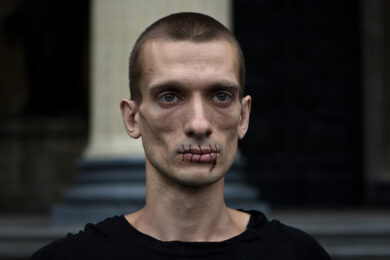Photograph courtesy of Petr Pavlensky
Last week, a Moscow judge ordered that the three members of feminist punk collective Pussy Riot, arrested for performing an anti-Putin "punk prayer" in the city’s Cathedral of Christ the Saviour, should remain incarcerated until January 2013.
Nadezhda Tolokonnikova, Yekaterina Samutsevich and Maria Alekhina have already been in prison for almost five months since their arrest in March on charges of hooliganism. If found guilty, they face up to seven years in jail. It’s thought that the Russian Orthodox church are pushing for the women to be kept incarcerated, a move enabled by their close links to Putin, the Russian President, with Vsevolod Chaplin, a spokesperson for the church, stating: "This sin will be punished in this life and the next."
Here’s a video of Pussy Riot performing the "punk prayer":
The case has highlighted Russia’s distressing clamp-down on freedom of expression. In an interview with Vice, one member of the collective, Tyurya, described the state of the country: "a third-world dictatorship with all its nice and classy features: horrible economy based on natural resources, unbelievable levels of corruption, absence of independent courts, and a dysfunctional political system. And under Putin we are up for another decade of brutal sexism and conformism as official government policies."
The group’s detainment prompted a widespread outcry, both in Russia and in the international community. Leading cultural figures in Russia have signed an open letter calling for a release, while a recent poll showed that 50% of the surveyed Muscovites were against their detention. Amnesty International, who have stated "we believe that Nadezhda, Maria and Ekaterina are prisoners of conscience, and are calling for their immediate release", have begun a text campaign to free the women, which has so far seen over 12,000 messages of support.
Earlier this week, while their pre-trial court hearings were taken place, artist Petr Pavlensky staged a protest against the incarceration in front of St Petersburg’s Kazan Cathedral, sewing his mouth shut and holding a banner that read "Pussy Riot act is a replay of a famous act by Jesus Christ".
We asked Petr about his art, his protest and Russia’s stance on freedom of expression.
Could you tell us about your background as an artist?
Petr Pavlensky: I’ve studied at the St. Petersburg Academy of Art and Design and the Institute «PROARTE». In my projects, I work on identifying the hidden contradictions surrounding me: the ideological system, its internal antagonisms and their subsequent collision, trying to help define its true content and purpose.
Last year, I participated in a special project as part of the III Moscow International Biennale for Young Art, a series of works displayed in the collection of State Museum of Political History of Russia.

‘Unconquerable Victory’ by Petr Pavlensky, displayed at the Center of Contemporary Culture FAKEL. Photograph courtesy of Petr Pavlensky
When did you first hear Pussy Riot and what do you think of them?
PP: I didn’t take Pussy Riot’s first action seriously. The negative response they provoked from the structures of power, though, has made them part of one of the most significant phenomena of political art in Russia today.
What was your reaction to their arrest?
PP: Until the most recent judgement, I naively believed that they would be let go. However, Russia’s lack of attention to intellectual freedoms reflects the government’s totalitarian position: completely ignoring any and all rights and freedoms.
Is the situation in Russia so bad that you felt you had to do something so extreme as self-mutilation?
PP: The suture of my mouth was, in my opinion, the most simple and accurate gesture of protest, with respect to today’s reality in Russia. The show trial of Pussy Riot, and other less high-profile cases, as well as the laws governing the establishment, send a strong message that society should shut up, and every careless statement may result in a ritual of punishment.
What was the process of actually sewing your mouth like to go through?
PP: In stitching my mouth, I had no problem: it’s just multiple punctures of the soft tissues and, in my opinion, this is not any comparison to the fact that the young girls [Pussy Riot] have experienced ritual punishment for the last six months.
How difficult is it to be making art or in a band in Russia today?
PP: The arrest of three young girls has been an open gesture from the government. Talking about Russia and the gradual process of suppressing freedom of speech and overall tightening of censorship, like Pussy Riot did, got in the way of totalitarianism, the authorities and the police state. The country is becoming one big ‘gulag’.
The authorities and their new ideological apparatus, the church, should ask themselves two fundamental questions. The first – if the Russian Orthodox Church has declared itself successor as the guardian of Christian culture, why does it so openly reject the fundamental Christian values? Perhaps it is some other ideology; if true, then she should make this clear and start using other symbols in the aestheticisation of its policies and the promotion of its brand. And secondly, the state must declare itself as a religious, not secular, country to the entire international community.
Alternatively, Russia could declare itself a secular state and observe, at least to some extent, international human rights, with the church properly recognising the principles of Christian culture. Then, clearly, Pussy Riot would be released with a public apology and compensation for moral and material damage.
Finally, what can readers of the Quietus do to show their support to Pussy Riot?
PP: I think that if every reader of the Quietus posted a simple call to boycott Russia’s totalitarian regime on their social network, it would help support the Russian intelligentsia against the appalling situation in which Russia finds itself.




